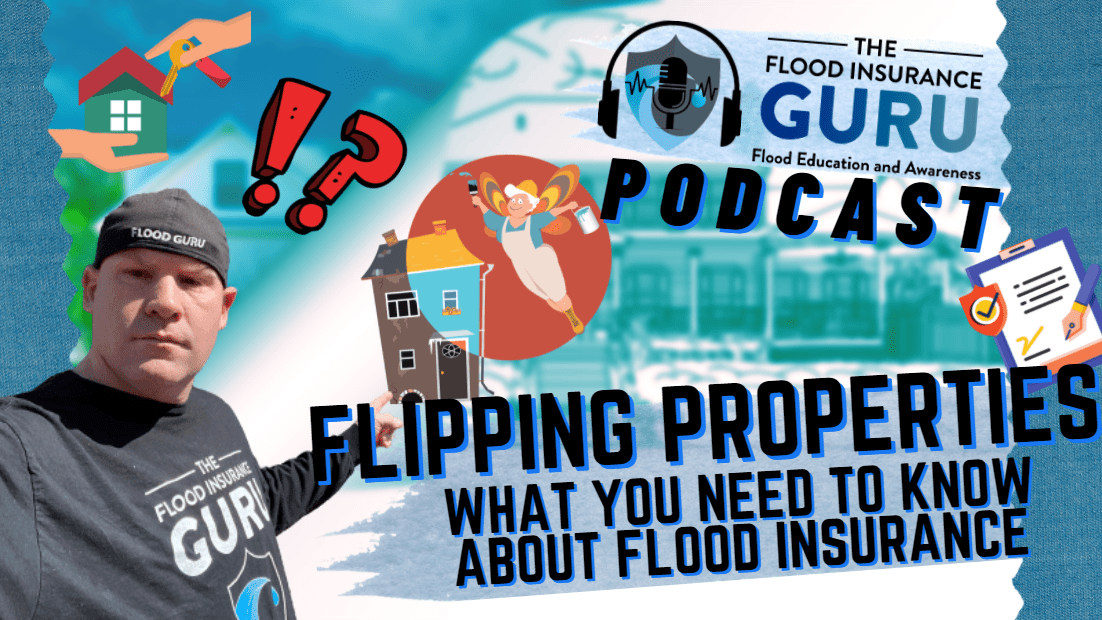The Flood Insurance Podcast Episode 34: Flipping Properties: What You Need to Know About Flood Insurance
September 23rd, 2019
3 min read
By Chris Greene

Let's talk about one of the big issues in flood insurance: flipping properties. So want to talk about the things you want to do if you're buying investment properties, fixing these properties, and reselling them, and what are the impacts that it can have on flood insurance? Could it stop you from selling the property of the profit? If you're a real estate investor, what should you be doing with these properties?

Protect Yourself
Flood Zone
Real estate investing in the house or houses can be both good and bad for you, but you want to make sure that you're protected by verifying the flood zone of the property before you purchase it. You can do this by simply going to FEMA's website through map services and then looking up the address. Always remember that if it's in that blue area known as high-risk flood zones, like Flood Zone A or AE, it means that the property's going to be required to carry flood insurance. Remember, regardless of the mortgage loan type will require flood insurance if the property's in a high-risk flood zone since they generally want to protect the value of the house of the person who took the loan. If it's the minimum-risk zones, like Flood Zone X, flood insurance isn't going to be required. This is the first thing you want to check.
Flood Loss History
The next thing you want to check before purchasing that property is to go to FEMA, but this time around you want to check on the history of flood losses on the property. If you're purchasing the property from an owner, you want to see if they could possibly get this list for you before you actually purchase. This can give you an idea of how many losses it got in the last ten years of at least $1000. Now, you should look into this because the property will be listed as severity loss property. Real estate investing on these types of properties can be very difficult when it comes to its sales and it can take away a lot of the profitability of selling the property since flood insurance could be very expensive due to the history of losses it has.

Foundation Type
Another thing you want to look into is to verify what type of foundation does the property has? Is it a basement, a crawlspace, a slab, and how far does it sit below the base flood elevation? These things have a big impact on the flood insurance rate which may negatively impact your sales on the house. For example, if the property sits more than three to four feet below the base flood elevation, flood insurance will be very high. Some insurance companies won't even write a policy for these types of property due to the flood risks it has.

The Type of Buyer
Now, you also have an idea of who is your potential clients for the property that you're putting up on the market. However, you really have to do a deep dive into the loan type they have. Remember, the flood insurance options, at the time of writing, depend on the loan type they have. People who are doing a Federal Housing Administration (FHA) loan can only get their flood insurance through the Federal Emergency Management Agency (FEMA) and the National Flood Insurance Program (NFIP). If they're doing a Veterans Affairs (VA), United States Department of Agriculture (USDA), or conventional loans then that's good since they can choose to go through FEMA or the private market for their flood policy. Real estate professionals always know upfront whom they're targeting the property, but sometimes miss this important detail.

Property Renovation
Now, there are some things that you need to know before you start renovating the property. The first thing you want to check on the year the house was built. You see, most flood maps were established in the late '70s and if the house was built before the first flood map, then it's considered as a pre-FIRM structure. Pre-FIRM or Pre-Flood Insurance Rate Map structures have different guidelines when it comes to flood insurance rates and get subsidized rates. If it wasn't substantially improved or has had any additions to the property then they're not required to carry an elevation certificate even if it's in a high-risk flood zone.

However, if you decide to improve the property at least more than fifty percent of the house's current market value, then what happens is they go off the year of the substantial improvements and not the year built. In turn, the property will now be required to carry an elevation certificate. This will impact the flood insurance options since pre-FIRM and post-FIRM structures have very different guidelines.
Always remember that 50% rule on substantial improvements and additions since this can really cost you a lot of problems when it comes to flood policy rates.
Flood Insurance
Lastly, you want to check the history of flood insurance for the property throughout the years. This can really help you and your potential buyer since they can do a policy assumption which also helps in marketing the property however it's important that you protect yourself from these investment properties and flipping properties. Having flood insurance means that the property has been protected and mitigated for flood damage throughout the years.

These are just some things you want to look into when you're flipping property in the real estate market. Real estate investing can really be costly, but it doesn't need to cause more issues on sales than not. So, if you have any questions on flipping properties and flood insurance, questions on how to properly start real estate investing, or anything about flood, reach out to us.
Remember, we have an educational background in flood mitigation and we want to share this knowledge with you, so you too can be prepared through flood education and awareness. Click the links below to know more and get started!




